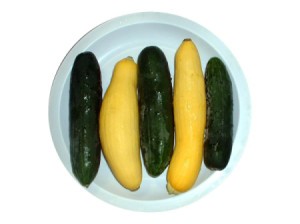
 What is the absolute best thing about ThriftyFun? Learning. Learning. Learning. Lately, I've corrected some misinformation posted by others. Don't think me smug, though. I've posted misinformation, too. I've had to eat my own words, apologize, and set things straight. Maybe the next best thing about ThriftyFun is that we keep each other on our toes.
What is the absolute best thing about ThriftyFun? Learning. Learning. Learning. Lately, I've corrected some misinformation posted by others. Don't think me smug, though. I've posted misinformation, too. I've had to eat my own words, apologize, and set things straight. Maybe the next best thing about ThriftyFun is that we keep each other on our toes.
Here's my latest 'Squash The Myth' entry. 'I planted pintos too close to my pumpkins. They cross pollinated. Now my pumpkins taste like refried beans and when my wife made a pumpkin pie, it gave me gas really bad. I got so tired of the angry stares, I took a long walk in the woods.'
Sorry, people. Things like this just do not happen. Planting squash near cucumbers will not cause them to cross pollinate or taste differently than they should. Even though they are in the same family, Cucurbitaceae, I'm not sure a professional breeder could successfully cross them in a lab.
Pollination is a sophisticated 'lock and key' affair. Think of the pollen receptors on the cucumber plant as locks. Think of the pollen from the squash plant as keys. Unless the pollen from the squash will 'fit' into the pollen receptors of the cucumber, there will be no cross pollination. Cucumbers bear male and female flowers and are self pollinating. In order for a squash to cross pollinate with a cucumber, (if it could be done), special measures would have to be taken to prevent the cucumber from pollinating itself.
With all that said, here's something else just as important. Let's say you want to cross two varieties of tomatoes in order to get a new variety with all the best characteristics of both parents. You don't just take pollen from tomato plant 'B' and pollinate the flowers on tomato plant 'A' and then get tomatoes growing on tomato plant 'A' with characteristics of tomato plant 'B'. It doesn't happen that way.
In order to get the combined characteristics, (including taste), of both parents, you would have to plant the seed from the tomato resulting from cross pollination. It is this seed that holds the combined information, not the tomato that contained that seed.
If your cucumbers taste like squash and are yellow rather than green, it ain't because they were planted close together. Something else is the problem, probably inadequate nutrients.
Pictured above is part of my 2015 early harvest. Due to limited container space, the heirloom straight neck yellow squash and the very delicious Poinsett 76 cucumber were planted close together. They each taste as they should.
(If I'm wrong, enlighten me. I will take it and appreciate it).
Source: My Garden
Add your voice! Click below to comment. ThriftyFun is powered by your wisdom!
I have no wish at all to be contrary, but we can and do cross honeydew and cantaloupe every summer, to obtain "cantadew". My husband loves honeydew, and most cantaloupes are a little too sweet for my liking, but these cantadews are wonderful, with slightly crisp flesh that is juicy and not too sweet.
We just plant the cantaloupe and honeydew interspersed and usually they cross pollinate somewhat. We still get plain cantaloupe and plain honeydew from all this also. Not all of the melons are crosses.
This is the only thing we notice will cross pollinate somewhat predictably in our large Midwestern garden...
4TruLady
I don't find you contrary, quite the contrary, I find you enlightening. As I said, ThriftyFun keeps us on our toes. The title to this post could have been better. My aim was to dispell the notion that squash and cucumber 'cross'. I still hold that they don't.
It stands to reason that the closer two vegetables are genetically, the more likelihood they could cross. And in this case honeydew and cantaloupe are much closer than squash and cucumber. My understanding is that both the honeydew and the cantaloupe are simply varieties of muskmelons (not exactly different 'vegetables').
What I would like to know is, are the seeds of the cantadew fertile, and if so, would the fruit have all the characteristics of the parent cantadew. Since it is a natural 'cross', there should be a way to 'tie this thing down', so you don't have to rely on chance of getting these melons.
Cantadews? I didn't know they existed. So you see, you're not contrary, you're informative, and I thank you.
Now, please tell me how I'll know the absolute best time to dig those yellow potatoes. The vines haven't died down, but are looking sad and are a yellow green rather than green.
Ooops! I'll have to speak with my Ag agent. Maybe I should have said 'cultivars' rather than 'varieties'.
Doug,
I suggest if they are yellow you could try one and see what's in there. We just started digging potatoes last night, because with all the rain we've had we're worried they will rot.
Our vines are for the most part just starting to turn yellow, but a few of them look really awful, and are mostly brown and yellow. Before the worst of the rain started I went out one evening with a hoe and hilled them up on each side of the row very high--in some places the dirt was mounded up over a foot--and I think that is what may have saved the plants for this long because the rain ran off more than soaking in.
So far (we have a hundred row-feet of potatoes so it's a several evening process) the harvest looks pretty good, with the only problem being some splitting, which makes for not so "pretty" potatoes, but they still taste great. We are getting some really big ones too, which is great, as when they are properly handled they keep much longer.
You could even just gently move your hand down into the dirt and feel for potatoes along the side of the cooler. I sometimes do that earlier in the season if I'm just itching for some little new potatoes...
Let me know how it goes!
Kate (a.k.a. "Trudy")
4TruLady
I should have told you. Over a week ago, I dug a little around one plant. I barely uncovered one potato that looked as large as it should be and lots of little ones. I didn't know if I should wait longer to see if the smaller ones would get larger.
Kate,
You're one smart lady. I value you're opinion. Tell me what you think. I propose that cantaloupes and honeydew are different cultivars of the muskmelon. I propose that if grown in close proximity, cross pollination can occur. I propose that the cantadew you harvest this year is not a result of cross pollination that occurred this year. I propose you save cantaloupe and honeydew seed from year to year. I also propose some of the seed you saved which resulted in a cantadew came from a cantaloupe (which looked and tasted like a cantaloupe, but it's flower was pollinated with pollen from a honeydew) or the seed came from a honeydew (which looked and tasted like a honeydew, but it's flower was pollinated with pollen from a cantaloupe).
This would mean you are 100% correct about cross pollination occurring in your garden between cantaloupe and honeydew. The only matter needing clarification would be when this cross pollination occurred. I propose it was the previous year.
Here is a Q&A excerpt from Bonnie Plants article 'Growing Cantaloupe and Honeydew Melons
libby
June 25th, 2012
I have planted my cantaloupe next to my honeydew will I have a problem with cross pollination? Could I end up with CANTA-DEW or HONEY-LOUPE?
Kelly Smith Trimble
June 25th, 2012
Hi Libby,
Ha ha, no, though those do sound rather tasty! If cross-pollination occurs, it would only show up if you saved the seeds from the fruit you get this year and replanted them for harvest next year. So your cantaloupe and honeydew should come out true to form this season. Happy growing!
Kelly, Bonnie Plants
Plant cultivation and fertilization is a vast, complicated and ever changing science. Cross breeding is much more complex than planting fruits close to together, beside etc.
All fruit (all vegetables are fruits) seeds sold to home gardeners are specifically bred for the soil and climate of the gardeners. The seeds often vary from year to year although the gardener may not realize these changes. Each seed type is a result of very complex scientific research and development for the specifics of home gardens. Because of constant ongoing research and change of these seeds, it is almost impossible that a home gardener can specifically cross-breed two or more fruits, even within species. Growing different melons next to each other, for example, will not produce a third melon with all or some of both parent's DNA. Cross-breeding is not a simple process of planting with the expectation of a specific result.
Home gardeners might produce specific types of fruit within species but this process requires scientific knowledge the average person would not have without intense and lengthy education in the subject.
Perhaps...but those cantadews certainly taste different - and quite delicious!
Doug,
We assumed that those seeds would be sterile, so we never tried saving them. It would be an interesting thing to do, so maybe I will try some this year.
I understand that others have strong opinions about these things, but I garden to please myself and feed my family. As far as my intelligence, I am reasonably intelligent, but more importantly, in 38 years of gardening I have learned a lot, and mostly I garden by instinct...I suspect you use a lot of that too, although you have a more scientific mind than I do.
Will let you know if we decide to delve further into the debate and save some Cantadew seeds. Wish I could hand you one across the back fence so I could get your opinion!
Kate
Dinah, all vegetables are not fruits, for example carrots, and cabbage. Only vegetables that contain seeds are fruits, like tomatoes and cucumbers and green peppers.
Ginnie,
My error!
I meant to say all seeded vegetables are fruits. Carrots and cabbage plants produce seeds above ground-in the carrot flower and in the cabbage "seed stalk" that grows above ground so they are specifically fruits. All nuts are fruits, as are potatoes, all the cabbage family, peanuts, soybeans, taro, onions, garlic, etc.
OK, Kate, I'll try to make this my last entry on Cantadews. Yes, I wondered what would happen if you planted seed from the cantadew. They may well be sterile as you suggest.
My later point was, if you saved seed from your cantaloupes and honeydews, you would have no way of knowing by taste or appearance of those melons, which contained seed that would later produce a cantadew.
Not only are you intelligent, you also are quite diplomatic.
Actually, I don't have a scientific mind at all. I have an inquisitive mind.
On a totally off the point note: Several prominent theoretical physicists are of the opinion that if the theory of everything is discovered, it will be so simple, a child could understand it. Oh, to be alive at that time.
I am reading all this feedback and learning so much. I didn't realize how many people were interested in this subject, nor how much information they had gathered about it. Thanks to all of you.
Add your voice! Click below to comment. ThriftyFun is powered by your wisdom!